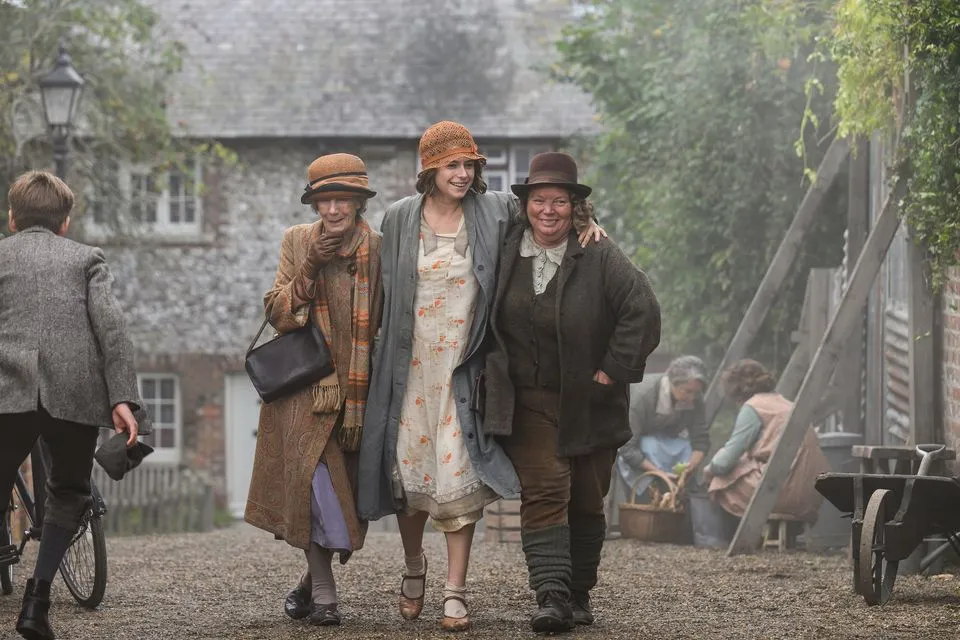
Film Review: Wicked Little Letters
Film
Wicked Little Letters
Director: Thea Sharrock
Film4 and Blueprint Pictures
In Theaters
As a film critic in Utah, I’m often asked to recommend an entertaining movie that people can see without having to worry about a lot of four letter words. Wicked Little Letters fits as nicely into the first part of that request as anything I’ve seen so far this year. As for the second…not so much.
In the English seaside town of Littlehampton in the 1920s, two neighbors, the devout Christian spinster Edith Swan (Oscar winner Olivia Colman, The Favourite) and lively Irish immigrant and war widow Rose Gooding (Jessie Buckley, I’m Thinking of Ending Things), strike up an unlikely friendship. However, after a falling out involving an incident at a birthday part for Edith’s stern father, Edward Swan (Timothy Spall, Harry Potter and the Prisoner of Azkaban), Edith is bombarded with 19 anonymous and libelous hate letters, each one filled with graphically obscene language. Rose, who isn’t exactly known throughout the town for watching her tongue nor being proper, quickly becomes the primary suspect and is arrested by the local constabulary. Rose goes to jail, leaving her daughter Nancy (Alisha Weir, Matilda: The Musical) in the care of Bill (Malachi Kirby, Roots), Rose’s boyfriend, and the letters cease for a time. Shortly after Rose’s bail is posted, the letters resume, and now they are being posted to numerous people throughout Littlehampton, coming out in a steady stream and causing a national sensation. A local police officer, Gladys Moss (Anjana Vasan, We Are Lady Parts) has nagging doubts about the case and decides to dig deeper into the matter, casting doubt on Rose’s guilt
Wicked Little Letters is based a true story that gripped the English news media during the ‘20s and while there’s a good deal of dramatization involved, the facts of the case, as well as the shocking contents of the letters, are faithful. It’s a remarkably absorbing and smartly-paced film that mixes silly comedy with surprisingly heavy drama that ranges from touching to genuinely unsettling. In the age of social media and modern politics, correspondence filled with personal attacks and extreme profanity may not seem like anything to get worked up about, and even in this setting, there’s plenty of humor drawn from the crude, oddly juvenile histrionics of the letters and subsequent outrage over them. The story works so well because the characters are so richly drawn and the screenplay by British comedian Johnny Sweet is terrific. Director Thea Sharrock (The One and Only Ivan) is very skilled at pacing and character-based storytelling and does strong work here.
Intentional or not, there’s something serendipitous about the casting of these two very different women, as the last time we saw Buckley and Colman in the same film, they were playing one character seen at different stages in her life in Maggie Gyllenhaal’s 2021 drama The Lost Daughter. This duality adds a wonderful subtext to the ways in which these two women both feel a definite connection and at the same time a strong resentment toward each other, and it doesn’t hurt that they are among the best thespians of our time. There is simply no one else who gets so many layers out of Edith than Colman, and it’s a performance that’s alternately amusing and haunting. Buckley is delightful, making Rose endearing and just maddeningly stubborn enough to make us believe she might well be pig-headed enough to be doing something this rash and absurd. Spall is a magnificent actor who seems to have shifted from being typecast as the comically jovial and simple everyman for half his career, only to now be consistently type cast as grumpy, distinguished and odious ever since his dramatic weight loss. Edward is a controlling, judgemental sexist with very little to make him remotely sympathetic, yet Spall manages to bring just enough honest emotion to keep him decidedly human. Vasan gives a charming performance as the quietly dedicated and overlooked Gladys, who is always identified as “Woman Police Officer Moss”, who eventually becomes motivated to stand up against injustice, fed up with the sexism she endures and inspired by the example of the suffragette movement. While her character has been greatly fictionalized, the choices that Sweet, Sharrock and Vasan have made in that portrayal make it a highly memorable role.
Wicked Little Letters isn’t a movie for all tastes, and not just because of the abundance of R-Rated language. The mix of comedy, drama and unexpected human tragedy provokes a variety of emotions that took me time to digest, as there’s a surprisingly sad element to the story that threatens the balance with the lightness of the comedy. In the end, I found it to be a solidly crafted film that ranks among one of the more interesting stories to hit theaters so far this year.—Patrick Gibbs
Read More Historical Film Reviews:
The Taste of Things
Uproar